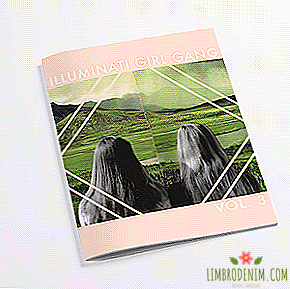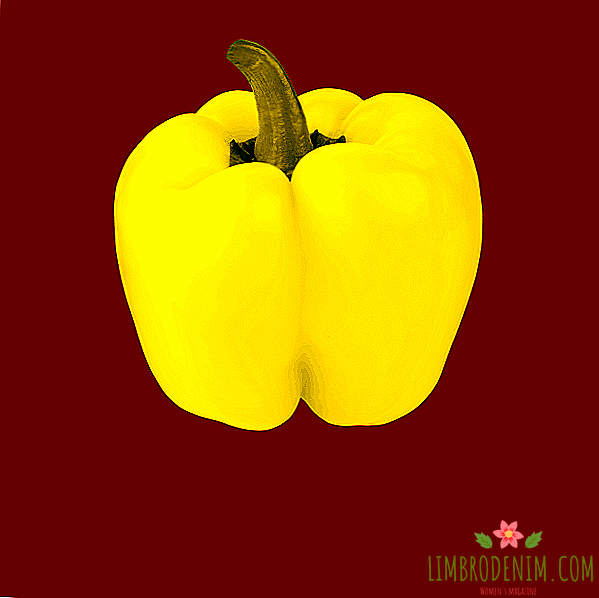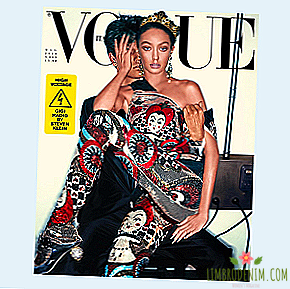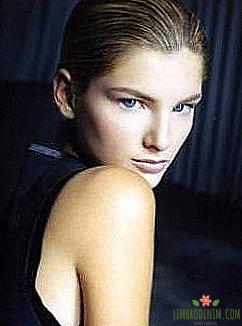Food stylist Nataliya Gribulya about favorite books
IN BACKGROUND "BOOK SHELF"we ask journalists, writers, scholars, curators, and other heroines about their literary preferences and publications, which occupy an important place in their bookcase. Today, the former journalist and culinary critic, food stylist, director and founder of the production studio Terreatory Natalia Gribulya, shares her stories about favorite books.

 Relations with books are about the same as with friends - someone with you for life, someone already outgrown, but someone else did not understand. My father's love for the adventure library, detectives and science fiction I could not completely separate, but I was strongly influenced by my acquaintance with the dystopian genre in transitional age. I think that I would not be me if I had not read Remarque and Balzac, Orwell and Golding at the age of fifteen.
Relations with books are about the same as with friends - someone with you for life, someone already outgrown, but someone else did not understand. My father's love for the adventure library, detectives and science fiction I could not completely separate, but I was strongly influenced by my acquaintance with the dystopian genre in transitional age. I think that I would not be me if I had not read Remarque and Balzac, Orwell and Golding at the age of fifteen.
Nobody taught me the habit of reading forcibly - since in elementary school my dad offered to read something that he liked at my age (as I remember those books - burgundy, blue, gray, - Jules Verne, Mine Reed, Jack London), forcing me no longer needed. I adored to read, in school and university years I read a lot and with pleasure. I was lucky to study in a wonderful school, at that time humanitarian gymnasium No. 1504, where a foreign literature course was considered a necessary thing for a student as rhetoric and Latin. So, I came to the literature lectures on journalism by a man who had already read almost everything on the program.
All my conscious life, the most difficult relationship I had with only one text - one that is my authorship. I didn’t have any outstanding literary talent, but the desire to write in different years led to one badly written book in high school, a rashly chosen profession of a journalist and feverish attempts to return to writing as a screenwriter.
The first work supplanted books from my life for several years: when you work with the text yourself, you want not to see it at the weekend, and on weekdays the only free time to read was hours in the morning and evening traffic jams. Then journalism gradually disappeared from my life, a production studio appeared, a slightly more measured pace of life and time and desire to read.
And then Bookmate appeared and again made me a happy reading man: always, everywhere, at any moment I have a lot of old favorite and new interesting books at hand. I read several at once simultaneously, choosing by mood: some kind of monumental novel, when you want a recreational reading, something useful in a specialty or non-fiction for a more thoughtful reading, when the goal is not to rest, but to think or get new knowledge. I try to read before bedtime, and I always read when I have free time: in a taxi, in a queue, with a lingering work meeting. I often read for food - it is generally a luxury and a double pleasure.
At work, I read either something related to the film industry - mainly, it concerns directing, producing and editing - or books whose names promise to stimulate my creativity, but in this area there is only one disappointment. In practice, creative deadlines are much better stimulated by creativity. In English, I often read professional literature. Partly because much of the industry standard of the film industry only exists in its original language. I am used to reading fiction in English in order to improve the language - and this is an ingenious way to expand active and passive vocabulary. You take a book, a pencil and a dictionary, sign the translation of all unfamiliar words, then re-read the page again - it enrages a long time and terribly, but it really works.
The pace of reading often depends on the genre and the pleasure that the process brings. If I like the book very much, I read quickly, at some moments I even find myself re-reading my favorite thought and even the whole page again, enjoying the way the author formulates his thoughts. A good literary language is very important; without it, it becomes poorer. Now it's summer, and I reread the "Dandelion Wine" for the fourth time. It has already become a habit: to return to it once every few years, and certainly in the summer, because this book makes any summer better — it’s checked.

David Foster Wallace
"Look at the lobster"
An underrated writer in Russia. Wallace's creativity passed me by in my years of study, they spoke about metamodernism only in passing, and then mentioning only Murakami, so I started to get acquainted with Wallace relatively recently. I still don’t know how to approach his big prose, but Wallace the essayist was a real discovery for me. “Look at the lobster” was first published in the gastronomic magazine Gourmet in 2004. After visiting Lockster Festival in Rockland and watching the feast around the huge lobster maker Wallace raises the question of whether future generations will perceive our food habits and agro-industry as something similar Nero’s entertainment or Dr. Mengele’s experiments. This is probably a strange choice for an almost omnivorous person’s bookshelf, but for me, “Look at a lobster” is a useful reflection that makes you think about where your personal ethical boundaries are and why they are there.
Nathan Myhrvold
"Modernist Cuisine at Home"
This is a gift of my beautiful friends for my birthday. The most important book for anyone interested in gastronomy, or rather its lightweight version. The original "Modernist Cuisine" is six volumes in which the former director of technology at Microsoft has invested so much time, effort and money that people who are not so committed to their passion, Mirvold's feat looks more like a mental disorder. The book has a thorough description of all physico-chemical processes that occur with food during various types of exposure to it, and the recipes and tables are in a separate notebook. The edition of fantastic beauty, some photos of home appliances cut in half.
Adrian gill
"On all four sides"
The collection of travel notes scandalous British columnist Adrian Anthony Gill - a man of wit, cynical and disastrously politically incorrect. It consists of two dozen essays, in most of which the author is frankly rude to residents of different countries. The story of the author himself is no less fascinating than his caustic passages regarding the nature, weather, wild manners and sexual perversions of different nationalities. Until the age of 30, Gill was not particularly busy with anything. Basically, he suffered from alcoholism and his own failure in everything, no matter what he took, and had a lot of time to master what the British so succeeded in the literary field - irony and caustic sarcasm, which immediately began to be used against everyone in a row, including against the British themselves.
All this, of course, did not bring him to good: 62 complaints in just five years of work in The Sunday Times and the hatred of a good half of humanity. The funniest chapters in the book are about the USA, where Gill wrote the script for a porn film, and about Iceland, where he went for the sake of the most beautiful women in the world with Jeremy Clarkson, the host of "Top Gear". In Russia, the book was published only as an appendix to the Afisha-Mir magazine (this is how I got it), and even then in an abbreviated version - instead of 21 essays, only 14. The essay on Russia was not included in the collection prudently.
Salman Rushdie
"Farewell sigh of the Moor"
Another of the authors dear to the heart and the book, after which I fell in love with him. I got my arm when I was nineteen years old, on the wave of my travels to India. A stunning beauty of the novel, with a dense, metaphorical narration and interwoven into the history of several generations of a Christian-Jewish family mysticism, Indian mythology and wisdom of life.
Alexander Mackendrick
"On Film-making:
One of the software books recommended by film school students came to me while studying at UCLA. For me personally, it is important for several reasons. Firstly, it proves that working in advertising gives the director invaluable experience. Secondly, it disproves the opinion that those who could not take place as a director themselves teach (Mackendrick has a convincing filmography with four strong works). Thirdly, that at the same time being a strong director and screenwriter is possible: at Mackendrick it turned out - this is a person who understands well the importance of a good script.
David Mamet
On directing film
Another of the industry standards, I recommend, along with the classic book "Making Movies" Sidney Lumeta. Mamet has a peculiar look at the direction, which I personally don’t like very much, but he gives a lot of useful advice about the development of the script. I advise you to read Mamet, then Lumet, and then do everything in your own way.
Pierre gagnaire
"175 Home Recipes With a Twist"
The road to me as a gift from the author is the first book by Pierre Ganier with recipes adapted for home cooking. In practical terms, recipes in cookbooks interest me a little - I don’t like to cook in principle, and even more so to cook something for which I have to spend a lot of time at the stove. But cooking books for me are a practical guide to food photography and food styling, each speaks its own visual language. In this, for example, everything is built on macro photography, and this is a lesson of exemplary composition.
Roy Thompson, Christopher J. Bowen
"Grammar of the Edit"
Not terribly weighty and very useful alphabet of editing from A to Z - a book for those who want to either install it themselves, or speak the same language with people to whom you give material for installation (for me, that is). The book lucidly, clearly and visually tells about the basic principles, techniques and installation rules with illustrations and diagrams. Awful help me out personally and taught me to criticize the installation reasonably.
Peter Weil, Alexander Genis
"Russian cuisine in exile"
Brilliant book! Books about food often sin with tediousness, which is already there: pour in something, add it, watch the fire and stuff bu-bu-bu. Because it is very difficult to write about food. Not easier than about sex - say the authors themselves. From the same book it is impossible to break away. Light, very ironic, full of insightful observations and subtle observations. It's just a very, very cool reading about the love of food and the taste of life between the lines.
Delores custer
"Food Styling for the Camera"
Just the best and most thorough food styling book I've ever held in my hands. It took Caster about fifteen years to ensure that her thirty-year experience in the industry was packed into a most thorough and meticulous publication. The book covers everything: the specifics of different genres and channels (editorial and advertising filming, catalogs, TV, movies), budgeting, preparation of props, filming, and also gives a bunch of useful and practical tips on working with different products, including difficult ones for shooting - This is primarily sauces, soups, ice cream.
There is a separate chapter on how to build business processes in a company that deals with food shooting, and the history of food styling as an industry over the past half century with all the significant stages and figures (hello to Julia Child and Alice Waters). The book came out so cool that it has gone through several reprints.




